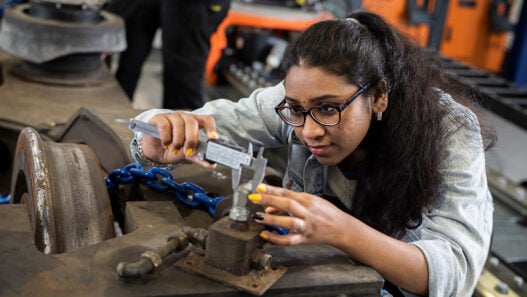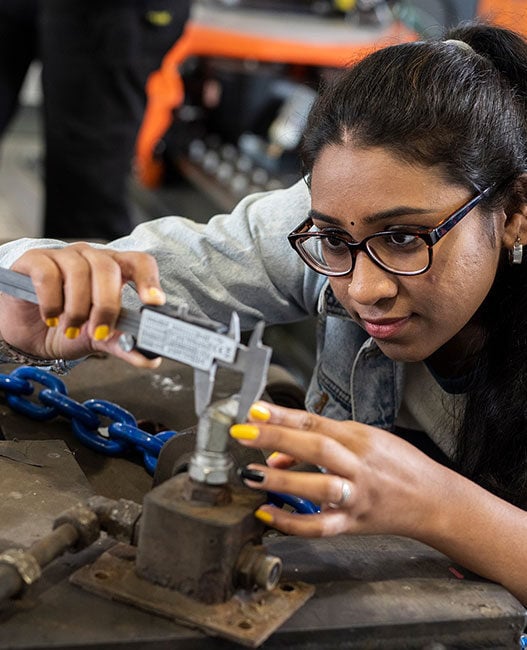There have been a multitude of headlines and resulting questions raised over the past few weeks. The recent outbreak of a coronavirus, called COVID-19, has left many of us worried and paranoid about our own health – fearful of catching the virus by interacting with other people and by carrying out everyday tasks such as travelling on public transport.
However, public health isn’t the only concern. European and Asian markets have tumbled, following Wall Street’s plunge as investors became even more concerned about the potential harm to global economic growth the virus’ impact will have. Stock markets in Britain, Germany and France have also been affected as they fell more than three percent in early trading. The market we are taking a particular interest in, however, is the electronics industry.
The situation has been described as “bizarre” by Mark Burr-Lonnon, Senior Vice President, EMEA, Asia and Global for Mouser Electronics. He said: “We have a depth of inventory that will enable us to help customers with any supply chain worries over the next three to six months.”
Burr-Lonnon’s concern is parts manufactured primarily in China, most notably multi-layer ceramic capacitors and chip resistors. “Most of the world’s chip resistors are made in China” he remarked. “We’ll have to wait and see what the long-term impact of the coronavirus on the supply chain will be. I’ve heard of companies down to 30% of production output and others at 70%. Right now, there is just not enough product coming out of China.”
“We haven’t seen any price increases as yet,” added Burr-Lonnon. “We have inventory we bought before the coronavirus outbreak so we can hold prices right now. If this situation continues some suppliers are talking about 30% price increases in the longer-term. It’s possible we could see price increases of 50% to 70%.”
Cancellations
With over 100,000 visitors expected to descend on Barcelona to celebrate all things tech at the annual Mobile World Congress, the Catalan city was a lot quieter than it should have been on the week of 24th February. For the first time since the show began back in 2006, it was cancelled after leading tech companies including Sony, Nokia, LG Electronics, Intel and Ericsson announced they would not be attending amid coronavirus fears.
However, another trade show that took place at the same time, and one that the Electronic Specifier team attends every year, embedded world in Nuremberg, went ahead as planned. NürnbergMesse normally welcomes around 150,000 visitors through the doors, however, embedded world 2020 saw approximately 900 exhibitors in the halls. The fact that the number was significantly lower than last year is due to the spread of the coronavirus, which prevented some companies from exhibiting.
Global semiconductor manufacturer, STMicroelectronics, who usually have a massive presence at the show, released a statement: ‘STMicroelectronics has been closely following the situation related to the novel coronavirus outbreak and has taken a number of precautionary measures to ensure the health and safety of its employees worldwide. As an additional measure, the company has taken the decision to withdraw from exhibiting at MWC 2020 in Barcelona and at embedded world in Nuremberg.’
Many other companies, including ARM, Cypress, Digi-Key, Intel, Microchip, Mouser, NXP, Renesas, Silicon Labs, Texas Instruments and Xilinx also made the difficult decision to withdraw from the show, putting the health and safety of its employees and customers first.
Speaking prior to the show, Dr. Roland Fleck, CEO of NürnbergMesse, said: “We have never held an exhibition under such complex global conditions before. Unfortunately, the effects of the coronavirus situation on this fair cannot be completely avoided. We regret but respect the fact that a number of companies did not attend the fair at short notice. Nevertheless, we are convinced that embedded world is attractive and worthwhile for exhibitors and visitors again this year.”
A hotspot for industrial transformation, HANNOVER MESSE typically sees around 200,000 visitors and 5,500 exhibitors, with 80 forums and conferences taking place over the space of one week. However, this exhibition has also bitten the proverbial dust. The event was due to take place on 20th-24th April but has been moved to the week of 13th-17th July.
HANNOVER MESSE released a statement saying: ‘The Hannover Region Health Authority has made a mandatory recommendation to follow and implement the advice of the Robert Koch Institute for major events. These include comprehensive measures to safeguard health when organising trade fairs. These requirements are not feasible for a major event like HANNOVER MESSE.
‘In addition, their implementation would have the effect of impairing the smooth running of the events to such an extent that the purpose of the event intended by the planned organisation could not be achieved either for the exhibitors or for the visitors, or only with considerable restrictions.’
Supply chain
Industry events aren’t the only thing that’s been affected by COVID-19 however. The virus has highlighted the increasingly important role China plays in global manufacturing, from clothing and chemicals to mobility, and especially technology. ecsn Chairman, Adam Fletcher, shared his thoughts on how the ongoing crisis may affect the UK and global electronic components market: “China is well established as the manufacturing power-house on which countless global industries depend, but the current disruption to large swathes of the Chinese manufacturing industry occasioned by the COVID-19 crisis has resulted in FUD (fear, uncertainty and doubt) throughout the country.
“In the electronic components supply network our initial concerns were primarily related to supply because many Chinese organisations were reporting that less than 50% of their employees had made themselves available for work, resulting in a dramatic reduction in China’s manufacturing output, and for that matter in the availability of the road, rail and air services needed to move products around or out of the country, resulting a shortage of dockside container and warehouse space. This concern, whilst not being resolved, has significantly diminished over the last few weeks as employee participation rates have increased to more than 85% and manufacturing output in China has ramped up probably close to 80% of normal capacity.”
He continued: “In its technology sector China is both the dominant supplier and a major consumer of numerous electronic components. Many international high-volume manufacturing customers located elsewhere in the world rely on ‘Lean’ or ‘JIT’ (Just In Time) manufacturing processes and need a constant stream of information about the progress of goods on order, or to manage any delays. In early February the answer to many urgent questions from customers about goods due or overdue from China-based manufacturers was an inscrutable “we just don’t know”, however this supple visibility has now improved significantly.

Above: Manufacturing capability has been severely impacted
“Obviously, the situation is far from normal but manufacturing and delivery priorities are being set in an effort to maximise output and meet delivery expectations. There will be some delayed shipments and disruption with manufacturer lead-times on many components extending. The vast majority of customers in the UK are served by Manufacturer Authorised Distributors, who are fortunately holding sufficient inventory to support their customers’ current demand for at least two months with components manufacturers striving hard to meet the global demand for electronic components.
“At the current time, despite the rising economic and social problems caused by the coronavirus outbreak, there is sufficient electronic components inventory to meet the demands of UK customers. All electronic components manufacturers and authorised distributors are implementing disaster recovery plans with the aim of protecting their employees, customers and organisations. If the current coronavirus escalates further or the period of the recovery extends, it’s more likely that a shortage of employees is going to be the ‘bottleneck’ to production rather than a shortage of electronic components. Unfortunately, we are now moving into a situation where global regulatory authorities from the World Bank, IMF, WTO and WHO and local country governments are going to have to make a coordinated international response.”
Steve Rawlins, CEO of Anglia Components, also shared his thoughts on the electronics supply chain, he explained: “It is no surprise then that we’ve had customers consider moving production away from China – either on a short-term or longer-term basis. Identifying a suitable supplier with the capacity and expertise to take over the work is only one half of the challenge in doing this however – the other is diverting the supply chain to ensure that the parts required are delivered to the new manufacturing location seamlessly and promptly.
“When a customer chooses to move their manufacturing to China, we are able to remove many concerns regarding the quality, continuity of supply and protection of IP by working closely with the customer and OEM/EMS factory to offer a seamless migration path, coupled with global price support, ensuring continuity is maintained. This capability puts our customers in a strong position if they now need to contemplate moving away from China – back to the UK, to mainland Europe or elsewhere in Asia. We will work closely with their new chosen EMS, the price will remain the same, and the high levels of inventory and buffer stocks that we’ve built up in Hong Kong and the UK will remain fully accessible – shipments can be diverted to a new site instantly.
“Providing customers fully consider the supply chain implications, there is no reason why they can’t move production away from China relatively quickly if the coronavirus issue isn’t resolved soon. We’ve partnered with many customers as they moved production to China. There has been no difficulty putting these arrangements into reverse as they consider how to respond to the current uncertainty.”
Legal
John Warchus, Partner and Specialist in Commercial Law, Moore Blatch, shared his insights on the current situation and its legal implications: “One industry that is particularly affected is the electronics industry – which is seeing delays in manufacturing processes due to a shortage of components and factories in China no longer running at full speed because of the outbreak. A recent IPC survey has revealed that two-thirds of manufacturers are reporting delays of approximately three to four weeks in the supply of basic components from China and Asia to the US and Europe.
“On top of this, the coronavirus outbreak is an illustration of the legal principles of force majeure (force majeure refers to a clause that is included in contracts to remove liability for natural and unavoidable catastrophes that interrupt the expected course of events and restrict participants from fulfilling obligations) and frustration which can, in the correct circumstances, excuse a company’s non-performance and/or lead to the early termination of a contract. Under English law, an express force majeure clause can protect a party from legal liability for delayed or non-performance of its obligations where this is due to a force majeure event.
“If the force majeure clause refers expressly to ‘epidemics’ or ‘diseases’, there is a reasonable chance that the virus will be seen as a qualifying force majeure event. Even if such wording is not present, many force majeure clauses refer to any circumstances beyond a party’s reasonable control and so it may also be possible to show that coronavirus should be seen as a force majeure event. If there is no force majeure clause, then the only way an affected party can avoid legal liability is through the legal concept of frustration. This is a hard test to satisfy and requires a party to show that it is either physically or commercially impossible to perform a contract due to a supervening event that has occurred since the contract was concluded through no fault of the affected party.
“Before a party asserts that it is entitled to claim force majeure or frustration, it needs to have a detailed understanding of all the background facts and details of the contract because getting this wrong will mean that the asserting party will itself be in breach, entitling the other party to terminate and claim damages. Companies within the electronics industry should be focusing, now more than ever, on the wording of all their supply contracts which are affected and the legal and business implications of delays within their supply chains.”
Conclusions
Having said all that, amid many trade shows being cancelled or postponed, it’s nice to hear that some are finding a way around the coronavirus obstacle. The CEO of software company, Inspekto, Harel Boren, has had to self-isolate in his home in Tel Aviv, following the expansion of Israel’s coronavirus quarantine restrictions. This was bad timing for the autonomous machine vision outfit, who were due to deliver a press conference at the Modex exhibition taking place in Atlanta, US, on 9th March. However, coronavirus did not stop the CEO from giving his press conference – instead delivering it virtually from his home in Israel, using conferencing tool Zoom.
It’s safe to say that there’s not a single industry that hasn’t been affected by the coronavirus. The rapidly spreading disease (now an official pandemic) is currently driving people to stockpile toilet roll, hand sanitiser (if you can get your hands on some) and pasta. And although some of us might consider this extreme and may even start to roll our eyes every time someone mentions it – it’s important to take a moment and remember that many have lost their lives and loved ones due to this outbreak.
Teri Ivaniszyn, Digi-Key Electronics Vice President, Operational Excellence, echoed this sentiment by stating: “At Digi-Key, our thoughts and prayers go out to everyone impacted by COVID-19 worldwide, and our primary concern is for the health and safety of our team members, customers and business partners.
“Our business model positions us with substantial inventory to offer minimal disruption to our customers, and we have worked closely with our multiple carrier partners to mitigate impact on cargo plans. We’re providing updates and FAQs on our website for our customers and we’re in constant communication with our suppliers.”
The good news is that many people have already recovered from the virus, including 70% of the confirmed cases in China who are now beginning to return to work. I’m no expert on the virus, however by being sensible and following the right advice, we can all play our part to help stop it spreading and contain the fear factor.
Currently the situation related to COVID-19 is changing on an almost hourly basis. Be sure to check our website for updates from the electronics industry.












